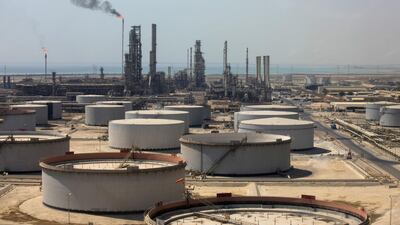Saudi Aramco signed a $12.4 billion deal for the sale of a 49 per cent stake in a newly formed oil pipeline venture to a consortium led by Washington-based EIG Global Energy Partners.
The agreement is Aramco's largest since its 2019 listing on the Tadawul exchange, when it raised more than $29bn.
The new venture, Aramco Oil Pipelines Company, will lease usage rights in the state oil company's stabilised crude oil pipeline network, which connects oilfields to the downstream network, for 25 years.
The subsidiary will receive a tariff from Aramco for oil that flows through the network, backed by minimum volume commitments.
Aramco will hold a 51 per cent stake in the venture, while EIG will hold the remainder. EIG said the deal had a total equity value of about $25.3bn.
The world's top crude exporting company will retain title to and operational control of the pipeline network and will assume all risk pertaining to operating and capital expenses.
The transaction, which was signed on Friday, will not impose any restrictions on Aramco’s actual crude oil production volumes.
“This landmark transaction defines the way forward for our portfolio optimisation programme," said Aramco president and chief executive Amin Nasser.
"We are capitalising on new opportunities that also align strategically with the kingdom’s recently-launched Shareek programme.
“Aramco’s strong capital structure will be further enhanced with this transaction, which in turn will help maximise returns for our shareholders ... Moving forward, we will continue to explore opportunities that underpin our strategy of long-term value creation.”
EIG chief executive Robert Blair Thomas said the deal was aligned with his company's “philosophy of investing in high-quality assets with contracted cash flows in critical infrastructure”.
EIG, which invests in energy and energy-related infrastructure around the world, has $22bn in assets worldwide.
Aramco did not name the other companies in the consortium.
The deal is expected to help the country's drive to pump billions of dollars into its economy to develop various large projects, build up the tourism sector, nurture local non-oil industries and boost job creation.
Non-oil revenue accounted for about half of Saudi Arabia’s total revenue last year. The kingdom’s sovereign wealth fund, the Public Investment Fund, plans to double its assets to $1.07 trillion and invest a minimum of $40bn a year in the domestic economy until 2025, helping to create 1.8 million jobs.
It will contribute $320bn to the kingdom’s non-oil economy and plans to grow assets under management to more than $2tn by 2030.
Aramco's deal comes after a similar agreement by Abu Dhabi National Oil Company, which was the largest of its kind last year.
Last June, Adnoc signed an agreement worth $20.7bn with a group of companies that included the world’s leading infrastructure and sovereign wealth funds that will invest in Abu Dhabi’s natural gas pipelines infrastructure.
The consortium will take a 49 per cent stake in Adnoc Gas Pipeline Assets, which has the leasing rights to 38 pipelines for 20 years.
The pipeline network spans 982.3 kilometres and delivers the company's gas to local customers in the UAE.
Aramco's senior vice president of corporate development Abdulaziz Al Gudaimi said the deal with the EIG-led consortium would unlock value from the company's assets and bolster "its resilience, agility and ability to respond to changing market dynamics".
No timetable was given for the closing of the transaction, which is subject to customary closing conditions, including any required merger control and related approvals.
Upon closing, Aramco will receive upfront proceeds of about $12.4bn.
Aramco produced 12.4 million barrels of oil equivalent per day last year, of which crude accounted for 9.2 million bpd.
Last month, Mr Nasser said the company planned to undertake “detailed engineering” to raise its overall production capacity to 13 million barrels per day.
Aramco reached a production capacity of 12.1 million bpd last April – its highest so far – before the Opec+ alliance approved a historic deal to cut supply amid the Covid-19 pandemic.
The pandemic disrupted global trade and led to the deepest recession in the global economy since the Great Depression.


